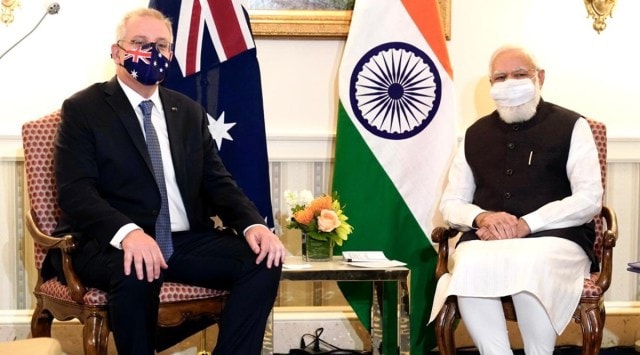- India
- International
Australia red-flags draft e-commerce rules: will raise trade barriers
The draft rules published on June 28 seek to tighten the regulation on online marketplaces. The Consumer Affairs Department had given time till July 21 for various stakeholders to submit their comments.
 Prime Minister Narendra Modi with Australian PM Scott Morrison. (Photo: Twitter/@PMOIndia)
Prime Minister Narendra Modi with Australian PM Scott Morrison. (Photo: Twitter/@PMOIndia)BESIDES triggering a strong pushback internally, the draft e-commerce rules of the government’s Department of Consumer Affairs have drawn flak from at least one sovereign government — Australia — and multiple foreign trade bodies for being intrusive and detrimental to trade.
The draft rules published on June 28 seek to tighten the regulation on online marketplaces. The Consumer Affairs Department had given time till July 21 for various stakeholders to submit their comments.
The Australian government, which is negotiating a trade pact with India — including a dedicated chapter in the agreement on e-commerce — has formally written to the Department of Consumer Affairs pointing out that the new rules would “impose extensive extraterritorial obligations on foreign e-commerce entities operating in India”.
“We consider the proposed amendments would be overly prescriptive and would increase trade barriers, particularly for SMEs,” it wrote in an undated submission titled “Consultation on proposed amendments to the Consumer Protection (E-Commerce) Rules, 2020 of the Government of India” made to the Ministry of Consumer Affairs, Food and Public Distribution.
Shadow on trade deals
AUSTRALIA’s views on India’s proposed e-commerce rules came in alongside trade pact negotiations between the two countries. The e-commerce sector finds a separate chapter in the pact. Detailed feedback from other foreign lobby groups also shows how India’s e-commerce sector could increasingly find a place in trade discussions.
A copy of this submission, and inputs submitted by other stakeholders for the draft e-commerce rules, were obtained by The Indian Express under the Right to Information Act.

Specifically, among the seven concerns it raised, are aspects such as definition of mis-selling, mandatory registration of e-commerce companies with the Indian government and time stipulation to redress complaints. Further, on the lines of concerns flagged by Indian government departments and industry players, Australia has also sought clarification on ban of flash sales.
“We support efforts to implement rules that prohibit fraudulent business practices online. We note however that the organisation of flash sales by e-commerce entities is commonplace and a widely accepted international practice. In that regard, we would welcome clarification on how fraudulent interception could be determined in practice, and what “technological means” might encompass,” it noted.
The Indian Express had reported Friday that the draft rules had received scathing feedback from several government departments including the Department for Promotion of Industry and Internal Trade, the Niti Aayog, the Ministry of Corporate Affairs, the Ministry of Finance and the Ministry of Electronics and Information Technology. These departments flagged several anomalies, questioned certain provisions, and suggested remedial tweaks with the proposed rules.
“In summary, the E-Commerce Rules, as written, are likely to have a significant adverse impact on Australian e-commerce entities which operate in India. The Rules would impose unreasonable compliance costs and be particularly onerous for SMEs, which would likely have implications on competition and consumer choice in India,” the Australian government wrote.
E-mail queries sent Friday to the Australian High Commission in New Delhi did not elicit a response.
Australian Minister for Trade, Tourism, and Investment Dan Tehan, who is on a visit to India, told a press conference on Friday he had discussed e-commerce with his Indian counterpart and that both sides had agreed there would be an e-commerce chapter in the final agreement. The two countries have already agreed to have an interim or early harvest trade agreement by Christmas and a final free trade agreement or Comprehensive Economic Cooperation Agreement (CECA) by the end of 2022.
India and Australia plan to exchange of offers regarding the proposed CECA agreement by October. Australia has said it wants access to Indian e-commerce channels for its premium food, beverage, and consumer product companies.
In addition to the Australian government, trade bodies and groups representing American businesses such as the US-India Business Council and the US-India Strategic Partnership Forum too have flagged several concerns on the proposed e-commerce rules in separate letters written on July 21. These pertain to clauses such as country of origin, mis-selling, registration of e-commerce entities, fall-back liability, and appointment of personnel already mandated under the new IT rules.
“These appointments not only unduly add to the compliance burden on e-commerce entities, there is no distinction between the roles and responsibilities of the various appointees…further, the obligation of RGO (Resident Grievance Officer) by an e-commerce entity overlaps with the similar obligation applicable to an intermediary under the Information Technology Act, 2000,” the US-India Strategic Partnership Forum noted in its inputs.
American companies Amazon and Walmart-owned Flipkart command a majority share in India’s e-commerce pie. Large domestic retail players such as Reliance Industries and the Tata Group too have plans to enter the segment.
Notably, in December 2020, the US Congressional Research Service, a bipartisan public policy research institute, had flagged concerns about “investment barriers” in India despite the aim to attract foreign investment. “US concerns about investment barriers persist nevertheless, heightened by new Indian restrictions on how e-commerce platforms such as Amazon and Walmart-owned Flipkart conduct business. From the US view, India’s weak regulatory transparency and other issues, such as IPR and localisation policies, add to concerns about FDI barriers,” it had noted.
Apr 26: Latest News
- 01
- 02
- 03
- 04
- 05








































